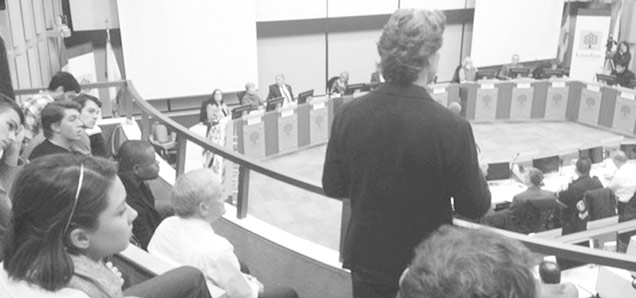One step toward mending fences
 CREDIT: BLACKBURNNEWS.COM
CREDIT: BLACKBURNNEWS.COMA London resident speaks to the Town and Gown Committee about his concerns over student parties.
Get to know your neighbours, people. It could be the first step toward bridging the miscommunication gap between London residents and students.
The City of London's core community groups were represented at the Town and Gown meeting, which took place November 13.
The topic of discussion that night was Project L.E.A.R.N. (Liquor Enforcement And Reduction of Noise). According to Tony Frost, executive director of reputation and brand management at Fanshawe College, the forum was held for residents and students to voice their concerns, thoughts and comments.
“Town and Gown is making sure we're aware of what is going on between each other,” said Frost. “Then we're working towards solutions that help us interact better.”
“Having everybody come and say how they feel and describe their interactions really helps us get to a point where we can start to come up with solutions that will remedy the situation,” Frost said.
Adam Gourlay, president of the Fanshawe Student Union (FSU) came out of the meeting with the impression that people are “strongly opinionated” when it comes to Project L.E.A.R.N.
“People were too strong on where they stand,” said Gourlay. “Is either side of it 100 per cent correct? No. But both sides made good points and it shows we have to work together as a community.”
Gourlay was reported by London Community News saying, “The Fanshawe Student Union was put in an uncomfortable position as it was perceived by much of the public that we were aware of the pursuits of the (LPS).”
However, he and the Student Union believe Project L.E.A.R.N. will serve students best by developing into an education piece. “We believe that Project L.E.A.R.N. is essential for developing a strong community relationship,” he said.
Gourlay also said that the door-to- door tactic could be helpful, but only with a different approach.
“If they don't gather information — if they just talk to students and make their presence known just by talking and being friendly and open-minded and communicative, that's where the benefit lies.”
From Frost's perspective as a voting member on the Town and Gown Committee, he saw light bulbs going off on both sides.
“At the end of the day, I think we'll all come away with a more enlightened view of each other and the actions that we take and how they affect each other,” said Frost.
But change will not happen overnight.
“Everybody will have to go away and formulate their own response to the issues.”
With waves of new students coming into London every year, for Gourlay and the Student Union, continuation of their door-to-door practices will hopefully stir change and squash the trend.
“Fanshawe's numbers for the amounts of incidences has gone down, and there's a reason,” said Gourlay. “Because of constant, consistent, transparent communication.”
The FSU president and his/her executive council go door-to-door at peak times of the school year — beginning, Halloween, St. Patrick's and end — to let students know when police are out in full force and why.
“It takes us a couple hours, but we still do it,” said Gourlay. “We're going into [the areas] no matter who's in this residence, we're going to talk to them if we can.”
To move forward, Frost suggests the meeting facilitated conversation and understanding.
“You have to appreciate what the other brings to where you are,” he said. “I do believe that at the very least, you've gone through this process, people will be more aware of each other. And that's going to lead to a good place for us.”













